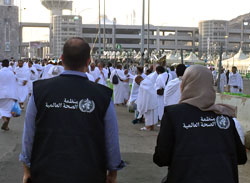 14 September 2016, Mecca – The World Health Organization (WHO) has today concluded its mission to Saudi Arabia to support the Ministry of Health in ensuring a safe pilgrimage season (Hajj). So far there has been no major health threat or event of concern, with no major disease outbreak reported among the nearly two million pilgrims attending the holy sites.
14 September 2016, Mecca – The World Health Organization (WHO) has today concluded its mission to Saudi Arabia to support the Ministry of Health in ensuring a safe pilgrimage season (Hajj). So far there has been no major health threat or event of concern, with no major disease outbreak reported among the nearly two million pilgrims attending the holy sites.
In preparation for the Hajj, the Ministry of Health, together with WHO, conducted a strategic health risk assessment of the health hazards that might occur during the pilgrimage. Based on the requirements of the International Health Regulations (2005), the Ministry put in place several public health mitigation measures covering areas such as infection prevention and control, points of entry, laboratories, coordination, risk communication and community engagement. Additionally many measures have been put in place to reduce the effects of high temperatures on pilgrims, including awareness campaigns on preventing sun strokes and heat exhaustion.
Preliminary information indicates a decrease in morbidity and mortality from seasonal influenza compared to last year. This might be related to the Ministry of Health’s decision to make seasonal influenza vaccine compulsory for all internal pilgrims. Some countries also vaccinated their pilgrims against seasonal influenza in accordance with Saudi Arabia’s health requirements for the Hajj.
No cases of Middle East respiratory syndrome coronavirus (MERS-CoV) have been reported so far among the pilgrims. Of 344 samples collected and tested by the national public health laboratory, none was found to be positive for MERS-CoV.
WHO has shared the conclusions and recommendations of the mission with the Ministry of Health, noting the importance of documenting and sharing experiences and good practices for improving public health preparedness for future Hajj seasons.
For more information:
Rana Sidani, Senior Communication Officer
Mobile: +20 1099756506
E-mail:
Mona Yassin, Communication Officer
Mobile: +20 1006019284
E-mail:


